浅谈英语的禁忌语_英文_
浅析英汉禁忌语文化
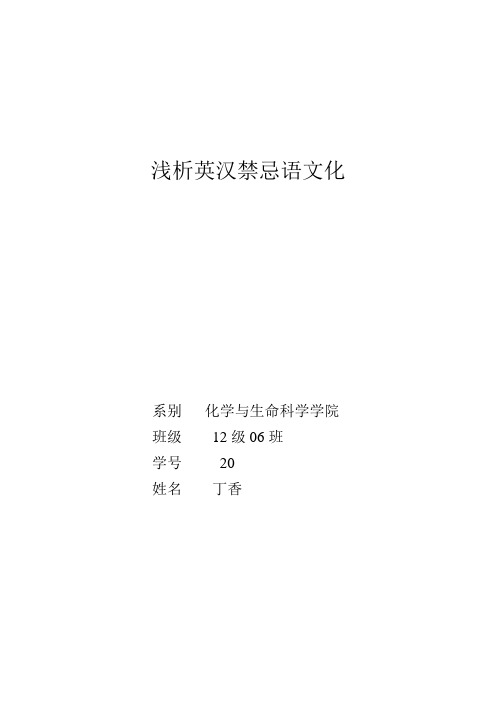
浅析英汉禁忌语文化系别化学与生命科学学院班级12级06班学号20姓名丁香浅析英汉禁忌语文化摘要:禁忌语是一种普遍的社会现象和语言现象,它与人类的生活有着密切的联系。
由于中西方文化的差异,导致了禁忌语存在较大的差别。
本文着重介绍中西方禁忌语的相似与差异,有助于我们更好地了解中西方的文化,完美地掌握交流用语,不至于说出一些对方反感的言语。
关键词:禁忌语相似差异一、英汉禁忌语的概况禁忌语是语言的一部分,就是指在日常交际中不能涉及到的特有的话题,可以说凡是在交往和公共场合中那些引起对方或公众反感或不快的一些词或表达方式都属于禁忌语的范畴。
在英语中,“禁忌”(Taboos)一词源于波利尼西亚语,原意指“神圣的”和“非凡的”,后引申为“禁止的”和“危险的”。
夏威夷语指导禁忌读作“卡普”(Kapu)。
在波利尼西亚文化中,禁忌是指“任何与帝王有关的而普通百姓接触后会有危险的事,或者帝王碰过后,从而变得具有威力的任何事”。
甚至帝王的影子对他来说也是危险的。
除此之外,波利尼西亚人还对其他一些显示力量的地方和事物用禁忌予以表示,例如某些食物、山脉或泉水。
“禁忌”这个词历史悠久,在各类历史文献中均有记载。
汉王符《潜夫论·忠贵》:“贵戚惧家之不吉而聚诸令名,惧门之不坚而为铁枢,卒其所以败者,非苦禁忌少而门枢朽也,常苦崇财货而行骄僭,虐百姓而失民心尔。
”汉应劭《风俗通·正失·彭城相袁元服》:“今俗间多有禁忌,生三子者、五月生者,以为妨害父母,服中子犯礼伤孝,莫肯收举。
”《后汉书·郎顗传》:“臣生长草野,不晓禁忌,披露肝胆,书不择言。
”唐苏拯《明禁忌》诗:“阴阳家有书,卜筑多禁忌。
”随着社会的发展,禁忌语在发展变化。
比如在中国人的俗信中,以为人的影子既和人的身体相像又和人的身体相关。
身体为阳,影像为阴,觉得影子大约就是自己的灵魂,所以古代有禁忌别人踩踏自己的影子。
而现在,这种说法已经少为人所知了。
浅析英语禁忌语的使用
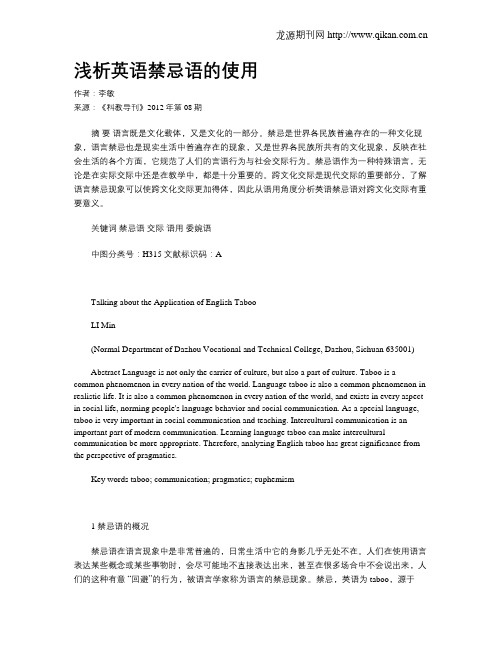
浅析英语禁忌语的使用作者:李敏来源:《科教导刊》2012年第08期摘要语言既是文化载体,又是文化的一部分。
禁忌是世界各民族普遍存在的一种文化现象,语言禁忌也是现实生活中普遍存在的现象,又是世界各民族所共有的文化现象,反映在社会生活的各个方面,它规范了人们的言语行为与社会交际行为。
禁忌语作为一种特殊语言,无论是在实际交际中还是在教学中,都是十分重要的。
跨文化交际是现代交际的重要部分,了解语言禁忌现象可以使跨文化交际更加得体,因此从语用角度分析英语禁忌语对跨文化交际有重要意义。
关键词禁忌语交际语用委婉语中图分类号:H315 文献标识码:ATalking about the Application of English TabooLI Min(Normal Department of Dazhou Vocational and Technical College, Dazhou, Sichuan 635001)Abstract Language is not only the carrier of culture, but also a part of culture. Taboo is a common phenomenon in every nation of the world. Language taboo is also a common phenomenon in realistic life. It is also a common phenomenon in every nation of the world, and exists in every aspect in social life, norming people's language behavior and social communication. As a special language, taboo is very important in social communication and teaching. Intercultural communication is an important part of modern communication. Learning language taboo can make intercultural communication be more appropriate. Therefore, analyzing English taboo has great significance from the perspective of pragmatics.Key words taboo; communication; pragmatics; euphemism1 禁忌语的概况禁忌语在语言现象中是非常普遍的,日常生活中它的身影几乎无处不在。
英语禁忌语大全
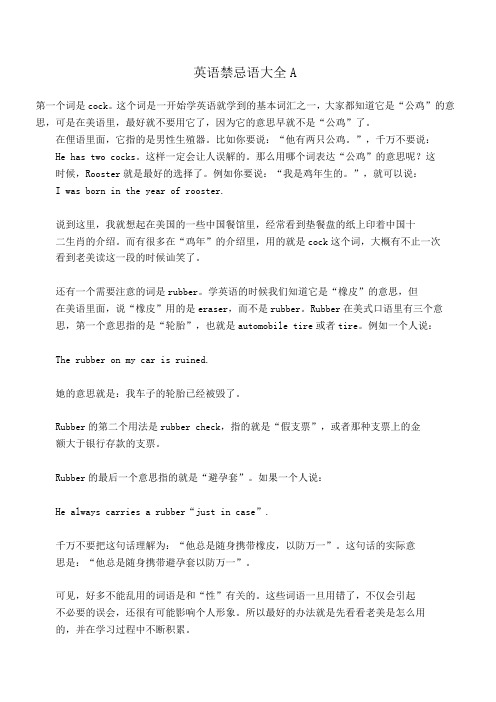
英语禁忌语大全A第一个词是cock。
这个词是一开始学英语就学到的基本词汇之一,大家都知道它是“公鸡”的意思,可是在美语里,最好就不要用它了,因为它的意思早就不是“公鸡”了。
在俚语里面,它指的是男性生殖器。
比如你要说:“他有两只公鸡。
”,千万不要说:He has two cocks。
这样一定会让人误解的。
那么用哪个词表达“公鸡”的意思呢?这时候,Rooster就是最好的选择了。
例如你要说:“我是鸡年生的。
”,就可以说:I was born in the year of rooster.说到这里,我就想起在美国的一些中国餐馆里,经常看到垫餐盘的纸上印着中国十二生肖的介绍。
而有很多在“鸡年”的介绍里,用的就是cock这个词,大概有不止一次看到老美读这一段的时候讪笑了。
还有一个需要注意的词是rubber。
学英语的时候我们知道它是“橡皮”的意思,但在美语里面,说“橡皮”用的是eraser,而不是rubber。
Rubber在美式口语里有三个意思,第一个意思指的是“轮胎”,也就是automobile tire或者tire。
例如一个人说:The rubber on my car is ruined.她的意思就是:我车子的轮胎已经被毁了。
Rubber的第二个用法是rubber check,指的就是“假支票”,或者那种支票上的金额大于银行存款的支票。
Rubber的最后一个意思指的就是“避孕套”。
如果一个人说:He always carries a rubber“just in case”.千万不要把这句话理解为:“他总是随身携带橡皮,以防万一”。
这句话的实际意思是:“他总是随身携带避孕套以防万一”。
可见,好多不能乱用的词语是和“性”有关的。
这些词语一旦用错了,不仅会引起不必要的误会,还很有可能影响个人形象。
所以最好的办法就是先看看老美是怎么用的,并在学习过程中不断积累。
第一章什么是不能说出口的英语:禁忌语与俚语a.禁忌语与俚语本书介绍的语言,在英语是属于淫秽的语言(obscene language),也可以说是脏话(dirty words)。
汉英禁忌语

汉英禁忌语一、禁忌语和委婉语语言禁忌 (Language Taboo),语言禁忌源于人类最初对自然现象和自然力的困惑和误解。
早在远古时代,人们因对日月交替风雨雷电、火山地震以及人和物的生老病死等自然现象和自然规律不理解,故幻想创造了神,认为神是万物的主宰、祸福的根源。
因此,神灵不可亵渎,与神灵有关的东西都应被尊为灵物,被列为禁忌,不可冒犯。
英语中,God(上帝)、Satan(魔王撒旦)等均有婉称,汉语中有国讳、圣讳、官讳或家讳。
疾病与死亡为人之大忌,无论是东方人,还是西方人,都十分忌讳疾病与死亡,所以在交际时都尽量回避这些字眼,以婉言称之。
禁忌语(taboo)是人们多数情况下不能说或不想说的话。
禁忌语多是与身体某些器官及功能或与宗教,崇拜有关,包括脏话(obscene)、粗俗语(vulgar)、和仵犯神灵的话(profane)。
禁忌语可以不用,可话不能不说,意思不可不表达,因而出现了大量的委婉语来代替禁忌语。
二、英语中委婉语英语中委婉语(euphemism)一词源自希腊语。
前缀“eu”的意思是“good”(好),词根“-phemism”意为“speech”(言语),合起来意思是“word of good omen”(吉言或好听的说法)。
委婉语是人类语言中普遍存在的一种语言现象,广泛应用于社会生活的各个方面。
由于语言交际是人类赖以维系社会关系和人际关系的重要手段,因此人们在交际中通常避免使用引起双方不快从而损害双方关系的语言,而采取迂回曲折的语言来表达思想、交流信息。
因此,委婉语自产生之日起,就担负着“润滑”交际的重任。
“如果没有委婉语,世界的运转会因摩擦而停止,人间将充满仇怨”。
正如美国学者Hugh Rawson 所描述的那样,委婉语“如此深深地嵌入我们的语言,以至我们中间没有谁——即便是那些自诩言谈直截了当的人——能够在不使用委婉语的情况下过完一天的”。
(一)有关“死亡”的委婉语人们生活中最忌讳的就是死亡,因此语言禁忌中关于死亡的委婉语大量存在。
英语词汇禁忌趣谈

英语词汇禁忌趣谈摘要:本文主要介绍了词汇禁忌语的类别、特点、形式,并通过具体的实例说明了词汇禁忌语在具体语境中的使用限制和特点,加强禁忌词汇的学习,对学习者在减少跨文化交际失误,增强跨文化意识,提高跨文化交际能力方面有着重要意义。
关键词:禁忌语;禁忌词汇;文化禁忌语(taboo):taboo一词起源于波利尼西亚汤加语,其汤加语的拼写为tabu,毛利语的拼写是tapu。
这个单词最早是在1771年英国探险家James Cook在汤加探险时从当地人那里学到的,并把这个单词引入了英语。
James Cook在描述汤加人的文化习俗时写道:“Not one of them would sit down,or eat a bit of any thing.... On expressing my surprise at this,they were all taboo,as they said;which word has a very comprehensive meaning;but,in general,signifies that a thing is forbidden.1”他还写道“Whe n any thing is forbidden to be eaten,or made use of,they say,that it is taboo.2”根据《大英百科全书在线》,Taboo 一词意义为“A taboo is a vehement prohibition of an action based on the belief that such behavior is either too sacred or too accursed for ordinary individuals to undertake,under threat of supernatural punishment.3”禁忌语包含如下三个部分:称谓禁忌、词汇禁忌、话题禁忌。
英语禁忌语和委婉语

Taboo’s representation
• Screw 笨蛋、傻瓜 • lay在字典上通常之意“躺下”的意思 .可是英语的lay并不是那样婉转 而文雅的话,是能与screw或fuck 匹敌的猥亵禁忌语 . Five cadets swore they all laid the girl one night on Jamaica Shore. (五名候补军 官承认,有一夜在牙买加海岸他们全体把她干了。) 这样以laid表示过去式的“非文法性”处处存在于猥亵语中,希 望各位能记住。 • Ass原意是“驴”,在俚语是“屁股”的意思,做为禁忌语则有“性 交”的意思。 • the business──从这里可以了解英语的妓女是business girl的理由了 。将职业妇女称之为BG (business girl)是不妥当的,原因就在这里了 。 • 通常short time是指“短时间的”,而和“时间”相对比,但英语的 short time 完全指“性交”这件事。
跨文化交际之中英禁忌语比较
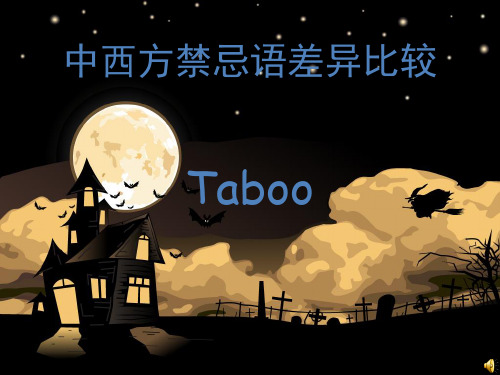
• 尊称 • 尊:尊府、尊兄、尊驾、尊夫人; 贤:贤弟、贤妻; 贵:贵体(有问候意)、贵姓、贵庚; 高:高朋、高见; 大:大礼、大作、大驾。 惠:惠存、惠临、惠顾、惠赠 • 令: 令尊、令堂、令郎、令爱
• 2) 西方受自由平等思想的影响,强调个体 和个人价值,提倡个人的自信和实事求是 的态度,面对赞扬与恭维,大多趋于接受 ,并表示高兴与感谢。
中西方禁忌语差异比较
Taboo
引言
• 在经济和信息日益全球化的今天,不同国家、不 同民族和不同种族人们之间的交流也日益频繁。 不同文化群体的人们在相互接触的过程中,不是 想说什么就说什么,在日常交际中也不是什么话 题都可以涉及,在一定的文化中,参与交际的人 们都会不约而同的对某些话题和某些词汇有意回 避,因为人们不愿或不敢随便谈论这些话题和词 汇,于是语言中就出现了禁忌语。
• 4)五与星期五 • 在中国,“五”是个和谐、优美的数字,表示 “圆满、完全”,特别受人喜爱。如“五湖四海 ”、“五光十色”等。在西方人的观念中,“五 ”没有特别的涵义,却认为“星期五是个不吉祥 的日子,常给人以恐怖之感。一种说法是,星期 五是耶稣受难日,所以主凶,还有人认为,据《 圣经》记载,人类的祖先亚当和夏娃被逐出伊甸 园也是星期五这一天。含有“Friday”的习语也说 明了这一点,如:Black Friday(耶稣受难日,发 生灾难事件的星期五)
• •
3)六与七 在中国,“6”是一个时空谐和数,最为吉祥。俗语“六 六大顺”即是最好的印证。在使用电话号码或汽车车牌号 时,人们尤其钟爱尾数为“66”、“666”、“6666”这几组 数字,因为它们象征着顺顺利利,万事如意。然而由于宗 教的影响,在西方“6”不是一个受欢迎的数字,被视为大 凶数,这从以下习语中也可见。如:at sixes and sevens( 乱七八糟;糊涂的;迷茫的)、hit sb. for six/knock sb. Six (给敌人/某人以毁灭性打击) 、six of the best (以藤 鞭击六———一种惩罚手段)、six penny(不值钱)、six of one and half a dozen of the other (半斤八两,差不多)等 。在西方“666”一直被基督教称为“魔鬼数字”,因为在 《圣经》中,恶魔撒旦的代表符号便是“666”,所以在基 督教中6 代表了浑沌不堪。
英汉语言交流中的禁忌语及委婉表达
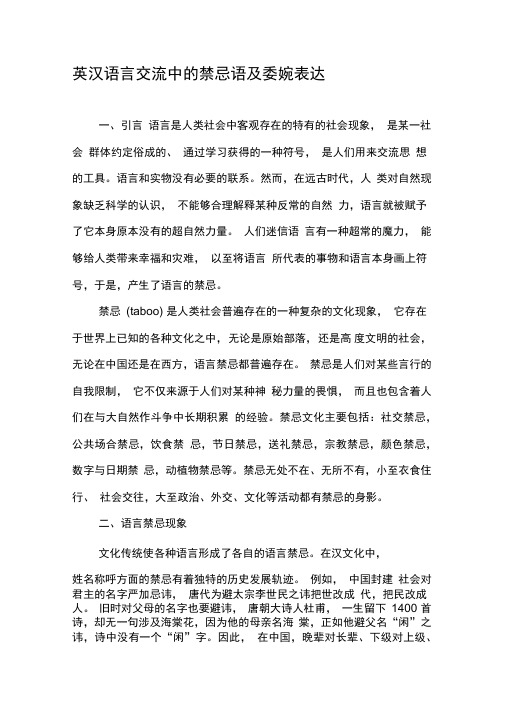
英汉语言交流中的禁忌语及委婉表达一、引言语言是人类社会中客观存在的特有的社会现象,是某一社会群体约定俗成的、通过学习获得的一种符号,是人们用来交流思想的工具。
语言和实物没有必要的联系。
然而,在远古时代,人类对自然现象缺乏科学的认识,不能够合理解释某种反常的自然力,语言就被赋予了它本身原本没有的超自然力量。
人们迷信语言有一种超常的魔力,能够给人类带来幸福和灾难,以至将语言所代表的事物和语言本身画上符号,于是,产生了语言的禁忌。
禁忌(taboo) 是人类社会普遍存在的一种复杂的文化现象,它存在于世界上已知的各种文化之中,无论是原始部落,还是高度文明的社会,无论在中国还是在西方,语言禁忌都普遍存在。
禁忌是人们对某些言行的自我限制,它不仅来源于人们对某种神秘力量的畏惧,而且也包含着人们在与大自然作斗争中长期积累的经验。
禁忌文化主要包括:社交禁忌,公共场合禁忌,饮食禁忌,节日禁忌,送礼禁忌,宗教禁忌,颜色禁忌,数字与日期禁忌,动植物禁忌等。
禁忌无处不在、无所不有,小至衣食住行、社会交往,大至政治、外交、文化等活动都有禁忌的身影。
二、语言禁忌现象文化传统使各种语言形成了各自的语言禁忌。
在汉文化中,姓名称呼方面的禁忌有着独特的历史发展轨迹。
例如,中国封建社会对君主的名字严加忌讳,唐代为避太宗李世民之讳把世改成代,把民改成人。
旧时对父母的名字也要避讳,唐朝大诗人杜甫,一生留下1400 首诗,却无一句涉及海棠花,因为他的母亲名海棠,正如他避父名“闲”之讳,诗中没有一个“闲”字。
因此,在中国,晚辈对长辈、下级对上级、学生对老师,决不能直呼其名,否则,会被视为唐突无礼、缺乏教养、大逆不道。
而在西方,除了某些特定工作头衔,如:教授、医生、博士、法官等外,一般是直呼其名,这反倒让人觉得亲切、友好和自然,就连父母与子女之间也是如此。
个人隐私在西方国家里也是人们最大的忌讳。
因此,在与西方人交流中,打听、询问关于个人的年龄,财产、收入、恋爱婚姻、宗教信仰、政治倾向等一些私事,即是用另一种方式侵犯了别人的隐私权。
- 1、下载文档前请自行甄别文档内容的完整性,平台不提供额外的编辑、内容补充、找答案等附加服务。
- 2、"仅部分预览"的文档,不可在线预览部分如存在完整性等问题,可反馈申请退款(可完整预览的文档不适用该条件!)。
- 3、如文档侵犯您的权益,请联系客服反馈,我们会尽快为您处理(人工客服工作时间:9:00-18:30)。
① 作者简介: 张立伟,武汉工业学院工商学院外国语言文学系英语专业本科生 ( 湖北 武汉,430065 ) 。
· 40·
浅谈英语的禁忌语★ 张立伟★
gious conviction that these gods controlled the world that they were living in. Therefore ,the first thing they did was to respect these gods through language. There is an example from the Seventh Commandment of the Ten Commandment in Bible — — — “You shall not make wrongful use of the name of the Lord your God ,for the Lord will not acquit anyone who misuses his name ”. In this way the earliest linguistic taboo emerged. The feudal patriarchal stage Feudal society is rigidly stratified. A feudal country is usually controlled by the royals and sometimes together with those considered to possess great people power given by god. During the feudal times, were not equal to the rulers and were suppressed by their superiors. The distinction between the upper and the lower classes was also reflected in the evaluation of the language used by them respectively. The words used by the upper class were considered good and elegant while those by the lower class were regarded as vulgar and indecent and should be avoided in public. The modern democratic stage In modern society ,as a result of the development of science and technology ,many natural phenomena are no longer mysterious. Human beings not only constantly improve their abilities to exploit the world through their great wisdom and knowledge but also make efforts to explore the extraterrestrial world. Thereby ,the superstitious elements in linguistic taboos decrease while those reflecting spiritual civilization increase. Ⅱ. The form of expressions on linguistic taboo There are taboos for religion ,sex ,death ,disease ,social bias,and they mainly embody in the following aspects. In vocabulary Roughly speaking ,taboo words in English fall into three types, namely obscenities, profanities and vulgarities. In obscenities Obscene words refer to words relating to sex in a shocking and offensive way ,and they may cause offence to the social moral principles. They usually go out of use on public occasions and cannot appear in literary language. These words are related to sexual behaviors and thus to be avoided in formal con-
“sacred ” and “consecrated ” , and on the other , “uncanny ” ,“dangerous ” and “unclean ” . He introduced it into English in his description of his third voyage around the world in 1777. However , taboo phenomena are not unique in Tonga. Instead ,it has long existed in all cultures and languages throughout the world. As is mentioned above ,linguistic taboo is not only a linguistic phenomenon but also a kind of social phenomenon. The development of society has influenced the development of linguistic taboo. To reveal the whole picture of linguistic taboo , a review of the history of linguistic taboo is necessary. “The evolution of linguistic taboo has generally experienced three stages according to the history of human society : the primitive superstitions stage ,the feudal patriarchal stage , and modern democratic stage. But there is no explicit demarcation line between three stages. ” The primitive superstitious stages People in the primitive society didn t get to know well about nature ,and most natural phenomena such as lightning and thunder were beyond the understanding of human beings. When these phenomena happened ,they thought that they were acting against and punished by certain supernatural creatures possessing great power. They thought that they would be safe or rewarded only when they were loyal to them. As a result,the primitive people created different kinds of gods. They held a strong reli-
In any language persons,things and activities that are taboos should not be talked about or should be mentioned in a roundabout way. Words and expressions related to these social taboos are linguistic taboo ,and as an integral part of language ,it is not only a linguistic phenomenon but also a social phenomenon. Like other parts of language ,the origin of linguistic taboo is deeply rooted in the social and cultural background and it changes with the development of human society in order to satisfy human beings needs for smooth communications. Linguistic taboos are a reflection of the social development and the value concepts and beliefs of the culture and they exist in every aspect of peoples life. A Lack of knowledge about language taboos or improper use of linguistic taboos may lead to misunderstandings, conflicts and other unknown serious consequences in the cross - cultural communications. I. The evolution of linguistic taboo The word “taboo ” was borrowed from Tonga , an island group in Polynesia ,and its first recorded use in English was by Captain James Cook , a British navigator. He came to the Archipelago of Tonga during his explorations in the southern part of the Pacific Ocean. There he heard the word from the local people ,which originally referred to persons,activities ( including speech ) ,or things under prohibition because they were considered , on the one hand ,
